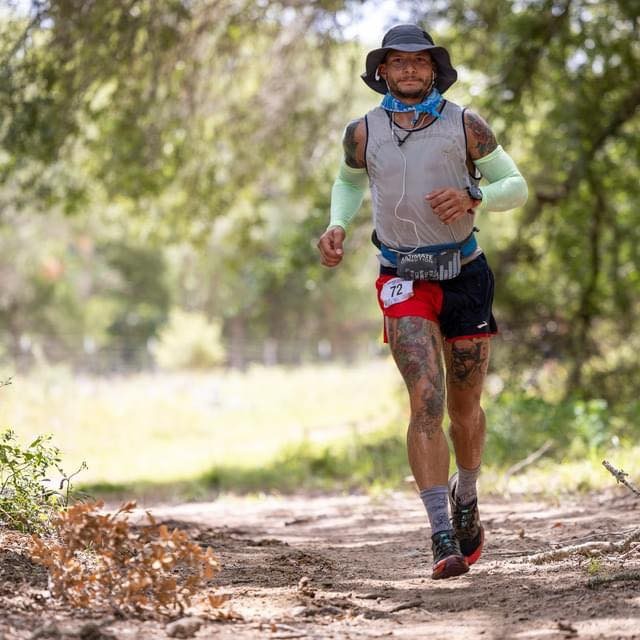Kenneth Anderlitch started running several years ago on a whim. Just to get away from his phone after a bad breakup.
"I quit smoking cigarettes just a week or two before, and [a friend and I] ran from SAC to the Tower of the Americas and back, and the whole time I'm thinking, 'Here I am running, and I'm not looking at my girlfriend's Facebook,'" Anderlitch said.
The 34-year-old San Antonio native hasn't stopped running since. Two years ago, he hoofed it 223 miles to support ChildSafe, a local nonprofit that provides support and services for child survivors of abuse.
This year, on Nov. 25, he'll take on an even more daunting challenge — running the entire width of Texas, starting in El Paso and ending in Logansport, Louisiana, to raise money for the treatment and sober living program Pay It Forward.
"I'm not very good at school, but I do it," Anderlitch said. "I feel like sometimes I'm not always the best at my job, because I can't remember stuff all the time. And when it comes to dating, I suck. But when it comes to running, that's something that comes so natural."
Despite his affinity for running, Anderlitch understands his trek across the Lone Star State will be grueling. He plans to travel 50 miles daily for three weeks to complete it, stuffing ice in his shirt and shorts to keep his body temperature down.
"I'm going to go through pain," he said. "It's just a matter of, how much pain can I endure?"
Anderlitch has already endured plenty of pain in his life. He had a turbulent childhood and started using drugs and alcohol at the age of 14. When he was 20, his mother, who used prescription drugs heavily when he was a teen, died of an overdose.
When Anderlitch returned home after his mother's funeral, a constable knocked on his door, arrested him for not paying a ticket and took him to jail. It was a sign of things to come as the rudderless young man struggled with addiction and homelessness. He spent several years in prison, overdosed 10 times and got used to what it feels like to be on the overdose treatment Narcan: "Like you have a cold."
Critical help
Anderlitch wanted to stop using, but he struggled to break the cycle. Six years ago, he completed a rehabilitation program, then moved into the sober living space at Pay It Forward.
Finding such a sanctuary was critical, he said, noting that the period directly after completing a rehabilitation program can be the most challenging for people in recovery. Many don't have steady streams of income, structure or even places to live.
"There's been treatment for a long time," Pay It Forward CEO Hamilton Barton said. "But where does someone go, especially someone that was homeless before they got to treatment? They certainly weren't working on a new house while they were trying to just save their ass."
Some people who don't have a place to live move back in with their families, but those environments aren't always conducive to sober living. Sometimes, families don't even want to welcome a person in recovery back into the home, Anderlitch said.
"Let's just [take] somebody who has been strung out on heroin for five, 10 years and then goes to rehab for two months — do you really want that individual back in your house at that time, just from two months away?" he asked. "With recovery, it takes time, it takes perseverance."
Anderlitch credits his months at Pay It Forward — where he got a driver's license and a job while living under curfew — as critical in his recovery.
"There was a camaraderie, because we all had to do that," he added.
Quiet confidence
Pay It Forward's assistance doesn't stop immediately after people move out of the sober living facility, either. The program covers the first two weeks of participants' stays at other sober living houses, giving participants a bridge between their services and what comes next. More than 90% of people who receive a free stay for their first two weeks in a sober house are still at the sober house after three months, according to Barton.
It's a path Anderlitch knows well. He's now in his sixth year working at the homelessness nonprofit Haven for Hope. What's more, he received his associates degree and is hoping to begin working toward a social work degree at Texas State University in coming months.
Throughout his journey, Anderlitch has remained markedly humble. He describes himself as "one of the laziest athletes you could come across," someone who doesn't like getting up early and eats Hot Cheetos "all the time."
But Barton said there's more to it than that.
"He's not loud, he's not boastful, he's not any of that stuff," Barton said of the runner. "He's always just sitting in the corner with a smile on his face. But, as I've watched him grow six or seven years, he's a guy who just really walks with a very quiet confidence."
Anderlitch said he's looking forward to running through the Guadalupe Mountains, but, with his characteristic humility, he pointed to Waco — the halfway point on the journey — as the place he's most looking forward to seeing.
"If I get there and decide to quit, at least it's not such a long way home," he said.
Follow us: Google News | NewsBreak | Instagram | Facebook | Twitter


